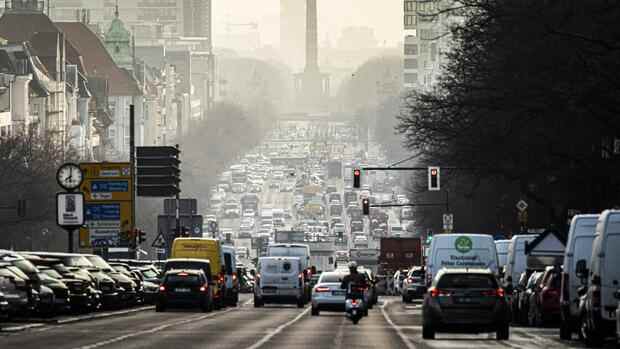By 2030, manufacturers should ensure that their new car fleets emit 55 percent less CO2 than in 2021.
(Photo: imago images/photothek)
Berlin The dispute over the end date for new cars with internal combustion engines has been settled. As the Handelsblatt learned from government circles, the Federal Environment Ministry had to give up its proposal to tighten the fleet limits at European level. “We have agreed on what is in the coalition agreement – no more and no less,” it said in government circles.
The agreement between the SPD, Greens and FDP states: “In the negotiations on the EU program ‘Fit for 55’, we support the proposals of the EU Commission and want to make the instruments in the individual sectors as technology-neutral as possible.”
In concrete terms, this means that from 2035 only climate-neutral vehicles will be allowed to come onto the market in Europe. On the way there should not be any tightening interim targets for which the car manufacturers would have to pay penalties should they miss them.
Environment Minister Lemke wanted to tighten the limit values
Rather, the proposal applies that manufacturers ensure that their new car fleets emit 55 percent less CO2 by 2030 than they did in 2021. This is already more than previously thought and means that from 2030 around two thirds of all new cars in Europe will be electric will drive. Since Germany is the largest sales market, there will probably be more here.
Top jobs of the day
Find the best jobs now and
be notified by email.
The internal government dispute has been smoldering since January. The trigger was the negotiations at the level of the European Council on the EU Commission’s climate package. The officials of Federal Environment Minister Steffi Lemke (Greens) had drawn up a comprehensive proposal that went beyond the specifications in the coalition agreement.
This stipulated that car manufacturers should even reduce their fleet emissions by 75 percent by 2030. This would put the share of e-cars at 85 percent. Since Germany is the largest sales market, all new cars in this country would have to be electric and four out of five cars within the EU.
The officials of Transport Minister Volker Wissing (FDP) intervened. There was also criticism from the SPD-led Federal Chancellery. Germany did not find a unified position until the first round of negotiations.
Since then, the issue has threatened to escalate, especially since the next round of negotiations is scheduled to take place in Brussels at the beginning of March and auto country Germany seemed to have no position on the future of its most important industry.
There was talk that the coalition committee could discuss this at its February meeting at the end of the month. But then other, actually undisputed topics suddenly threatened to end up back on the agenda of the confidential advisory body, it warned.
Accordingly, Chancellor Olaf Scholz (SPD) decided the dispute and referred to the coalition agreement, as it was said. Another sentence from the agreement between the SPD, Greens and FDP also applies: “According to the proposals of the European Commission, only CO2-neutral vehicles will be permitted in the transport sector in Europe in 2035 – this will have an effect in Germany correspondingly earlier.” The existing system of fleet limit values is being used to ensure that only vehicles that can be refueled with e-fuels can be newly registered. Synthetic fuels would then have to be counted as climate-neutral.
More: The federal government invests billions in local transport – and doesn’t know what will happen to it

